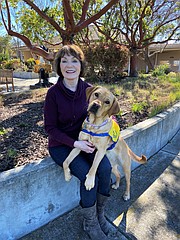Puppy raiser trains future service dogs to help those with disabilities
▶️ Listen to this article now.
SAGLE — Lilly Mitsui still remembers what it was like the first time she met one of her puppy’s new owners.
The woman Mitsui met had suffered her first stroke at just 30 years old, and was recently married, recalled Mitsui, who has raised puppies to become service dogs since 1995.
“She burst into tears, and threw her arms around me and thanked me for raising this dog for her,” Mitsui said. “She's 35 now, and I'm proud of her.”
Mitsui worked with Canine Companions for Independence, a nonprofit that connects people with disabilities to their future service dogs at no cost. She’s still in contact with all the families of the dogs she’s raised, she said.
On Monday, after 18 months of care, Mitsui dropped off her last puppy, a Labrador retriever and golden retriever mix named Tilley, for more professional service dog training.
“It's hard to part with them,” Mitsui said. “But it's just kind of another way to give back.”
Service dogs at Canine Companions are trained for a total of roughly two years before they’re ready to help their new owners. If all goes well, Mitsui will get a call in about six months to tell her Tilley has been matched with her new owner. Then, if the pandemic allows for it, she’ll travel to the organization’s headquarters to meet the family and officially pass Tilley on to her new owners.
Although it’s difficult to part with the dogs she’s raised since puppyhood and put so much care into, Mitsui said seeing the impact they make in peoples’ lives is worthwhile.
“I call it the toughest job I love to do,” Mitsui said.
There are a wide range of disabilities and needs service dogs are able to help their owners with, said Michelle Williams, public relations and marketing coordinator for Canine Companions.
In some cases, service dogs help people with physical disabilities, such as learning to pull someone in a wheelchair and helping them avoid rotator cuff injuries. Other service dogs provide help for veterans with PTSD and are trained in anxiety and nightmare interruption.
Still others are trained to help children with both physical and cognitive disabilities, often with similar training as for those with PTSD, or act as hearing dogs, alerting owners to sounds around them.
Regardless of what challenges their handlers face, the service dogs help to increase their independence, Williams said.
The program, which was founded in 1975, has placed 6,600 “graduate teams” of service dog and handler, and currently has 2,500 active graduate teams.
In the state of Idaho, the program has 23 service dog teams and 13 puppies being raised, Williams said. Mitsui serves as the chapter president for the Inland Northwest chapter, where there are currently eight puppy raisers.
After taking a break for a few years and returning to puppy raising, Mitsui is now on her sixth puppy, and an eight-week-old Labrador retriever and golden retriever mix named Skipper.
Raising a service puppy is not unlike raising any other puppy, Mitsui said. Skipper will still get to be a puppy and have playtime. But he’ll also learn that when he’s in his service vest, it’s time to work.
Mitsui will teach Skipper a series of 30 basic commands, and as he gets older, start socializing him and bringing him to places like restaurants and stores. There, he’ll learn how to sit quietly under a table, and get used to having lots of people around him.
When Mitsui first moved to North Idaho, she said, there wasn’t any local chapter for Canine Companions. She started one, and as she raised puppies more people became interested in the program.
Tilley became well-known in the community, Mitsui said, and her work raising and training puppies has also made residents more aware of the program.
“Coming over on this side of the mountains, I was so surprised to see that people didn't know about Canine Companions,” she said. “Disabled people aren't rich, and a lot of them think that, ‘oh, I could never afford a service dog.’ And they may not even know that this organization exists for them.”
People who want to apply for a service dog are required to go through a screening process, but are not charged for the services, Williams said. The nonprofit is sustained by donations.
The dogs themselves are bred at the facility in Northern California, and selected for a calm temperament and good health so they’re well-suited for service work, she said.
People who are selected for the program go through a two-week training program at the Northern California facility, where Canine Companions has accessible dormitories for their stay while they train with their new service dog.
As facilities start to open up again, Mitsui said, the program will also be providing presentations for local groups who are interested.
The organization is always looking for more puppy raisers, Williams said. Those who are interested in puppy raising can go to cci.org/raise, and people who are interested in applying for a service dog can visit cci.org/apply. Those who wish to become one of the professional trainers can visit cci.org/careers.
Lilly Mitsui can also be reached directly at 208-304-4490.



